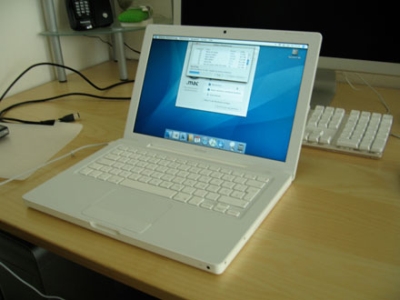
I’ve been wary of this for a while now, and I’m really glad that Wired has stepped up and addressed the issue straight away-I’ve seen similar articles from editors of MacWorld, and editors of PCMag, but this is an excellent writeup of how even one or two people with a complaint, whether it’s valid or not, can wind up generating an online rumor mill that winds up creating the appearance of poor quality control when in reality it’s nothing of the sort.
My favorite example of this is the MacBook “mooing” and the MacBook “random shutdown” issues that have both been reported, although only the latter is truly valid. The first may be a stray machine or two, but if you listened to the online echo chamber, you’d think every other Macbook that’s shipped has some kind of hardware problem, but it’s just not true. The “random shutdown” issue has been verified, and is valid, of course, but it’s such a rare issue that the number of people complaining about it easily outnumber the people who have actually had a Macbook with the problem, and the people who actually have the problem have had no problems getting Apple to repair or replace their Macbooks. It’s an example of growing pains for Apple, of course, with these “complaints” from a combination of actually disgruntled customers (as any company would naturally have) and apple haters, echoing across the internet. But as Leander Kahney, writing for Wired says:
Apple Computer seems to be suffering from a lot of problems with quality control lately: IPods are riddled with Windows viruses, laptop batteries are bursting into flames, and MacBooks are randomly shutting down.
Every few days, there are fresh reports of battery recalls, mooing MacBooks or iPods that scratch too easily.
But is Apple’s reputation for quality really slipping?
It’s my impression that Apple’s quality control is no better or worse than before — we’re just hearing about it more.
Consider that Apple is growing like crazy. The company shipped 1.6 million Macs and 8.8 million iPods last quarter. That’s more computers and iPods than in any three months in the company’s history, representing a 30 percent to 35 percent annual growth rate.
This past year, Apple sold more than 39 million iPods and 5.3 million Macs, all while switching to a brand new architecture based on Intel chips. If 99 percent of these Macs and iPods are in good working order, and 1 percent were defective, there would be 53,000 malfunctioning Macs out there and about 390,000 dodgy iPods.
That’s almost 450,000 upset Apple customers, all making a stink on forums and websites. I don’t think there’s anything like that number, or even half that, or half that.
There obviously are some problems; that can’t be denied. And certain machines seem more problematic than others. There are few complaints about the iMac, but lots of bitching about MacBook Pros.
The problem is figuring out whether the problems are widespread, or restricted to a small — but vocal — minority. One of the joys of writing for the net is hearing from scores of copy Nazis and propellerheads if you make a mistake or express a controversial view. But if you write something people like, you hear nothing, not a peep.
The same is true for quality control. You’ll never hear from the silent majority of happy campers out there.
Leander’s on point, and usually is-he knows what he’s talking about, and I think most journalists and geeks know he’s telling the truth. There’s a serious difference between legitimate technology issues that need to be addressed, and noisy complainants on message boards and blogs-and in the meantime, the people who are happy with their products are blissfully silent. Given that the iPod, the iMac, the MacBook, and the MacBook Pro, among Apple’s other offerings (when’s the last time you heard someone complain about an XServe?) are doing so well and Apple’s growing so steadily, I’d think that the complaints are a natural part of the growth process.
Still, it’s difficult to separate the signal from the noise, especially when complaining is involved. I think it’s a commentary on the persistence of a small number of noisy people, or perhaps more the ease of broadcasting your opinions online, than any real assessment on the quality of Apple’s products.
